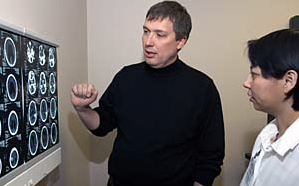Sad News
Posted in News Story

Last month, GUMC and MNRH lost an amazing doctor, researcher, leader, and friend, Alexander Dromerick, MD, after a long, courageous battle with a systemic illness. Dr. Dromerick served in his role as professor and Chair of Rehabilitation Medicine for Georgetown University since 2013 and Vice President of Research at MedStar NRH since 2012.
See below for the original announcement of Dr. Dromerick’s passing.
Dear GUMC Community:
I write with deep sadness to share that our friend and colleague Alexander W. Dromerick, MD, died Saturday at MedStar Georgetown University Hospital. Alex was chair of GUMC’s Rehabilitation Medicine Department and vice president for research at MedStar National Rehabilitation Network (NRH).
Alex’s legacy will undoubtedly be his passion for improving the lives of his patients — achieved through his tireless work as a clinician, devoted researcher and inspiring medical educator. A professor of rehabilitation medicine and neurology, Alex skillfully used his leadership positions to create and grow clinical research and educational collaborations spanning our two institutions and beyond to focus on brain recovery and restoration of motor function after stroke, traumatic brain injury, and limb loss. An enduring example of this work was his co-leadership and strong collaboration with Elissa Newport, PhD, to launch the Center for Brain Plasticity and Recovery, a joint enterprise between Georgetown University and MedStar NRH.
Alex had been leading several NIH-funded clinical studies. He was principal investigator for the Stroke Central Atlantic Network for Research, a part of NIH StrokeNet and the only national StrokeNet site at a rehabilitation hospital. He was co-principal investigator of the NINDS-funded I-CARE trial, a phase III trial to improve arm recovery after stroke. He was also co-Principal Investigator of the NINDS-funded PROTECT DC phase II clinical trial, aimed at reducing recurrent stroke in urban underserved individuals.
Alex’s mission was to accelerate research beyond incremental changes to improve the lives of individuals with stroke. One of his most significant contributions will be the CPASS trial, a phase II, randomized clinical study to determine the optimal time after stroke for intensive motor training. The results will be published soon in a manuscript in press with PNAS, and the outcome has the potential to shape the future of stroke rehabilitation for function of the hand and arm.
Alex was also a research scientist at the Washington DC Veterans Affairs Medical Center where he conducted studies to improve prosthetic arm function in veterans and to improve the battlefield screening for traumatic brain injury, funded by the Veteran’s Administration and the Department of Defense.
The care Alex gave patients was always informed by research — an approach he passed on to others through his NIH K12 training and career development grant with Barbara Bregman, PT, PhD. She noted that Alex was dedicated to fostering the next generation of clinician scientists and that his work as a medical educator launched the careers of many of today’s senior level leaders in stroke rehabilitation.
As a leader in neurorehabilitation, Alex held several leadership roles at national organizations and had been serving on the American Heart Association National Advisory Committee. His dedication to research and teaching was recognized by numerous awards. Alex completed medical school at University of Maryland, did his residency at University of Pennsylvania and completed his fellowship at Penn and at Princeton University.
As you may know, Alex had been dealing with a systemic illness for many months. During this trying time, he and his wife Laurie demonstrated remarkable resilience and courage, persevering through challenge after challenge, and he was able to return home in the weeks before his death. In addition to Laurie, Alex is survived by Laurie’s children, Michael and Emma, who were beloved by Alex. We will keep the family in our thoughts and prayers and share information about his memorial service when the details are finalized.
Sincerely,
Edward B. Healton, MD, MPH
Executive Vice President for Health Sciences
Executive Dean, Georgetown University School of Medicine
